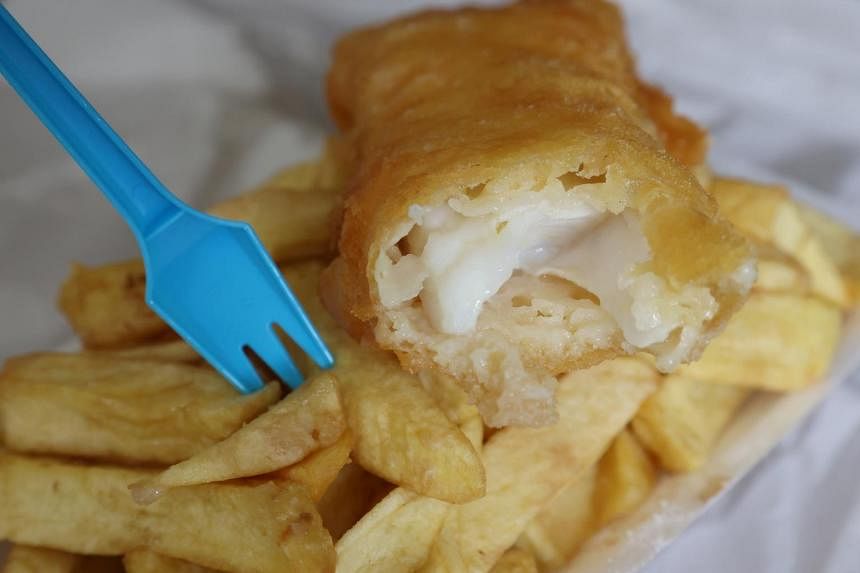WEST DRAYTON (REUTERS) - At west London's Hooked Fish and Chips, Mr Bally Singh is struggling to keep the tills ringing for a British tradition, with prices skyrocketing for fish, potatoes, cooking oil and even the flour used for the batter the dish is cooked in.
Cranking up their bubbling oil fryers only to see customers stay at home, Mr Singh and thousands of other normally thriving "chippies" across the nation are navigating the economic fallout of the Ukraine war, the coronavirus pandemic and Brexit.
"Fish prices have gone up extortionately, oil prices have gone up extortionately, and everything across the whole spectrum that we sell has gone up extortionately," Mr Singh told Reuters.
Fish and chips in hand, Prime Minister Boris Johnson once promised to "build back batter" from the pandemic.
Now, though, rising prices are veering Britain's economy further off course. A third of fish and chip shops are at risk of going bust this year due to a "perfect storm" of price pressures, according to insolvency firm Company Debt.
In just a year, prices for Britain's favourite fish - cod and haddock - are up 75 per cent, sunflower oil is up 60 per cent and flour is up 40 per cent, the firm said.
Inflation reached a 40-year peak of 9 per cent in April, the highest in the Group of Seven countries, and is projected to rise further. British consumers are more pessimistic than their peers in Europe, leading to criticism of both government and Bank of England efforts to keep a lid on the cost of living.
Cod and chips in Mr Singh's shop now costs £9.50 (S$16.40), compared with £7.95 a year ago. He said that if he passed on all the higher costs, the price would be closer to £11.
"We are finding it a struggle to keep our prices reasonable and competitive compared with other fast foods that are in the area, and we have actually seen a decline in fish sales and customers walking through the door," said Mr Singh.
Russian fish feeds Britain
Battered fish and fried chips, the chunky equivalent of fries in the United States, have fuelled Britons since the combination was invented 160 years ago.
The meal is such a staple that unlike other food in Britain, it was not rationed during the world wars. Chippies, with their distinctive smell of oil and vinegar, remain a presence in most towns.
Some of the recent difficulties for fish and chip shops began after Brexit, trawler company UK Fisheries said, estimating that the amount of Arctic cod Britain is allowed to catch in 2022 reduced to around 40 per cent of what it was before leaving the European Union.
Russia's invasion of Ukraine has driven up fuel and electricity prices, further increasing the cost of catching, and frying, fish. The war has sent cooking oil, fertiliser and flour prices higher too.
Cod and haddock are sourced in the Barents Sea, north of Norway and Russia, and the war has heightened uncertainty over those supplies.
In March, the British government listed Russian white fish as among goods to be hit with a 35 per cent tariff as part of sanctions in response to the invasion of Ukraine. It has paused the move, for now, while the impact is investigated.
Sunflower oil is the principal agricultural commodity that Britain imports from Ukraine and the government says it is working to substitute it with other vegetable oils, for instance, receiving extra rapeseed shipments from Australia after a strong harvest there.
A spokesman for the Department for Environment, Food and Rural Affairs said it was "working closely with industry, including the National Federation of Fish Friers (NFFF), to mitigate the challenges that they are facing".
However, the federation said fish and chip shops were facing their biggest-ever crisis.
"I am getting daily phone calls from people who are worried that they are going to go out of business," said NFFF president Andrew Crook.
In Swanage, Dorset, builder Malcolm Petherick, 73, is worried that the changes he has seen over his lifetime might result in Britain losing a part of its cultural heritage.
"When I was growing up, it was a poor man's meal," he said.
"Now, just bought two lots of fish and chips: 23 quid. What family can afford that?"

